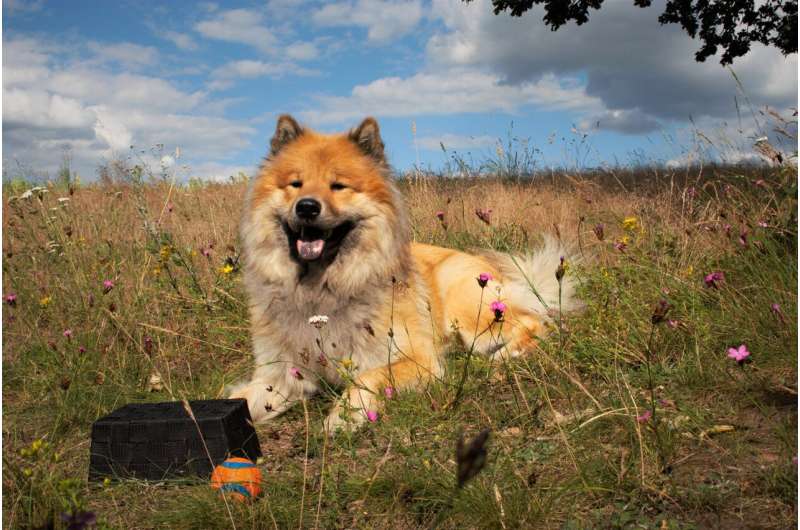Owner behavior affects effort and accuracy in dogs' communications

Human communication has evolved mechanisms that can be observed across all cultures and languages, including the use of communication history and the principle of least effort. These two factors enable us to use shared information about the past and present and to conserve energy, making communications as effective and efficient as possible. Given the remarkable sensitivity of dogs to human vocalizations, gestures and gazes, researchers have suggested that 30,000 years of domestication and co-evolution with humans may have caused dogs to develop similar principles of communication—a theory known as the domestication hypothesis.
On this basis, researchers designed an experiment that would examine the factors influencing the form, effort and success of dog-human interactions in a hidden-object task. Using 30 dog-owner pairs, researchers focused on a communicative behavior called showing, in which dogs gather the attention of a communicative partner and direct it to an external source.
While the owner waited in another room, an experimenter in view of a participating dog hid the dogs' favorite toy in one of four boxes. When the owner entered the room, the dog had to show its owner where the toy had been hidden. If the owner successfully located the toy, the pair were allowed to play as a reward. Participants were tested in two conditions: a close setup which required more precise showing and a distant setup which allowed for showing in a general direction.
The researchers found no evidence to suggest that dogs adhere to the principal of least effort, as they used as much energy in the easier far setup as they did in the more difficult close setup. However, this might have been a result of the owners influence on their dogs' effort. Secondly, dogs were not affected by different communication histories, as they performed similarly and used similar amounts of energy in both setups regardless of which condition they began with. Despite putting in similar amounts of effort, dogs adapted their showing strategies to be more or less precise, depending on the conditions.
The findings indicate that a crucial factor influencing the effort and accuracy of dogs' showing is the behavior of the dog's owner. Owners who encouraged their dog to show where the toy was hidden increased their dog's showing effort but generally decreased their showing accuracy.
"We've seen in previous studies that if we keep eye contact with the dog or talk in a high-pitched voice, we seem to prompt a 'ready-to-obey attitude' which makes dogs very excited to follow our commands. So when owners asked their dogs 'Is the toy here?' and pointed at the boxes, they might have caused dogs to just show any box," says Melanie Henschel, main author of the study.
Although the researchers found no effects of communication history or the principal of least effort, the current study indicates for the first time that owners can influence their dog's showing accuracy and success.
"We were surprised that encouragement increased mistakes in dogs` showing accuracy. This could have impacts on the training of dogs and handlers in fields where dogs are working professionals. Future studies should focus on the complex effects of the owner's influence and the best strategies for handlers communicating with a dog." adds Juliane Bräuer, senior author and head of the DogStudies Lab at MPI-SHH in Jena.
More information: Melanie Henschel et al, Effect of shared information and owner behavior on showing in dogs (Canis familiaris), Animal Cognition (2020). DOI: 10.1007/s10071-020-01409-9
Journal information: Animal Cognition
Provided by Max Planck Society



















